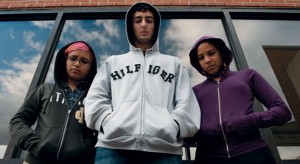As the Trayvon Martin case continues to spark a national outcry against racial profiling, Ithaca College students are uniting to incite awareness on a local level.

A group of more than a dozen students gathered yesterday near the Campus Center during the lunch hour, with hoods pulled up, ready to make a statement and a demand for justice. They stood stationary but in solidarity, with posters in hand that read “Being Black is Not a Crime,” “We are Trayvon Martin” and “See Us, Florida? We are standing our ground, too.”
Though they were making a visual statement with hoodies and posters, the student made several chants throughout the protest.
“What do we want?” sophomore and event organizer Cöelis Mendoza said, in addressing the students. “Justice!” they replied. “When do we want it?” … “Now!” “For who?” … ”Trayvon!”
Mendoza, a member of the Committee for Inclusive Education — a group of students who fought for the college’s Asian-American Studies minor — spearheaded and coordinated the movement and was particularly vocal during the protest.
“Trayvon Martin’s case is not the exception,” Mendoza said. “It is not something that happens once a year. There are thousands of Trayvon Martin’s a year that are hardly ever publicized in this way, and when they are publicized, things happen as with the Rodney King revolutions. We like to call them riots, but I do not believe that they are riots, they are an expression of civil unrest.”
On Feb. 26 in Sanford, Fla., the 17-year-old Martin was killed by crime watch volunteer George Zimmerman. Martin was carrying a pack of Skittles and a can of iced tea. The “Hoodie Movement” was sparked in response to the notion of Geraldo Rivera in a Fox News Channel segment in which the host stated Martin, because of his hoodie, was suspicious.
Protesters spoke out against those racial stereotypes in an attempt to initiate a discussion on racial profiling.
Senior Zachary Anderson criticized the “Stand your Ground” law, a Florida statute that permits anyone who feels threatened to act in self-defense.
“It’s a racist law that ultimately benefits white patriarchal forces of power that ultimately oppress young black males,” Anderson said. “It is a system of systemic prejudice that ultimately oppresses black males, and there is no justice for a system such as this.”
Other students, such as sophomore Marcus Henry, who’s been following the Martin case since his death in February, felt a more personal connection to the movement.
During the movement, students gave testimonials remembering other victims, who, similar to Martin, were oppressed because of skin color, including Emmett Till, 14, who was tortured and killed in Mississippi in 1955 for reportedly flirting with a white woman, and Shawn Greenwood, 29, who was shot and killed two years ago in Ithaca over drug suspicions.
Though small in number, Mendoza said it takes the effort of an individual to make an impact on a large group.
“People want to believe that our individuals acts don’t amount to anything,” Mendoza said. “But if we all unite, we can accomplish so much together. It’s about community; it’s about support. Coming together — that makes change.”







